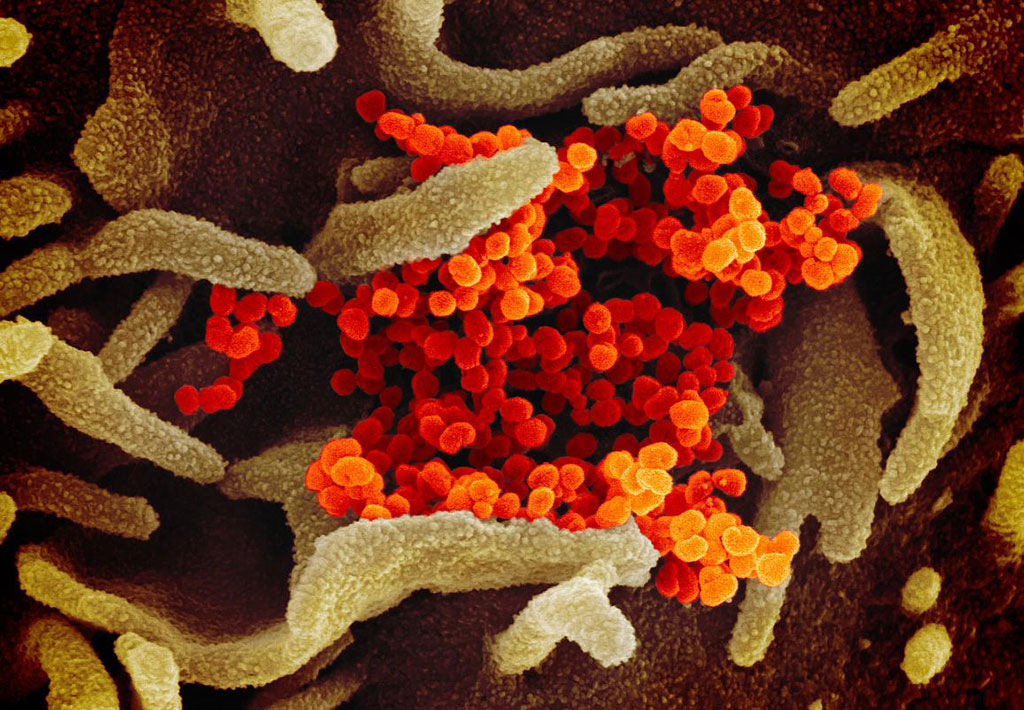Stanford Researchers Investigate New Drug that Can Treat Mild COVID-19 Cases and Stem Viral Shedding
|
By HospiMedica International staff writers Posted on 19 May 2020 |

Image: A scanning electron microscope image of SARS-CoV-2 (Photo courtesy of NIAID-RML)
Scientists at Stanford Medicine (Stanford, CA, USA) are investigating whether a molecule called interferon-lambda can help people with mild cases of COVID-19 feel better and reduce their transmission of the disease-causing virus.
The drug, interferon-lambda, is a manufactured form of a naturally occurring protein that has been given in previous clinical trials to more than 3,000 people infected with hepatitis viruses. Results in laboratory settings and in animals also suggest that lambda-interferon may be helpful in controlling viruses that cause respiratory illnesses such as influenza and SARS, an often fatal disease, as well as help snuff out other common viral infections. Interferon-lambda orchestrates the body’s natural defenses against infection by issuing a “call in the troops” order to constituent cells of the immune system. Receptors for interferon-lambda are restricted to the linings of the lungs, intestine and liver, thus producing fewer side effects.
The clinical trial is underway at Stanford Medicine will determine whether the drug can keep people who have just tested positive for the coronavirus out of the hospital, help them recover faster and make them safer to be around in the meantime. The researchers will also investigate whether the drug stems viral shedding, which would reduce transmission to family members and the community. The investigators are recruiting 120 participants who have just been diagnosed with cases of mild COVID-19 at Stanford Health Care and other local hospitals, emergency rooms, clinics and drive-through testing sites. Trial participants, randomly sorted into two groups, will be given single injections under the skin of either a placebo or interferon-lambda. Then they will be monitored for 28 days for symptoms, disease severity, rates of hospitalization, and duration and quantity of viral shedding.
“Even though these individuals may not need hospitalization, infection with COVID-19 results in respiratory symptoms and lost productivity,” said Upinder Singh, MD, professor of infectious diseases and of microbiology and immunology at the school, who is co-leading the study. “Plus — and this is important — patients with mild disease contribute to community disease transmission. Limiting viral shedding from this group would reduce transmission to family members and others, which is crucial to controlling epidemic disease spread.”
Related Links:
Stanford Medicine
The drug, interferon-lambda, is a manufactured form of a naturally occurring protein that has been given in previous clinical trials to more than 3,000 people infected with hepatitis viruses. Results in laboratory settings and in animals also suggest that lambda-interferon may be helpful in controlling viruses that cause respiratory illnesses such as influenza and SARS, an often fatal disease, as well as help snuff out other common viral infections. Interferon-lambda orchestrates the body’s natural defenses against infection by issuing a “call in the troops” order to constituent cells of the immune system. Receptors for interferon-lambda are restricted to the linings of the lungs, intestine and liver, thus producing fewer side effects.
The clinical trial is underway at Stanford Medicine will determine whether the drug can keep people who have just tested positive for the coronavirus out of the hospital, help them recover faster and make them safer to be around in the meantime. The researchers will also investigate whether the drug stems viral shedding, which would reduce transmission to family members and the community. The investigators are recruiting 120 participants who have just been diagnosed with cases of mild COVID-19 at Stanford Health Care and other local hospitals, emergency rooms, clinics and drive-through testing sites. Trial participants, randomly sorted into two groups, will be given single injections under the skin of either a placebo or interferon-lambda. Then they will be monitored for 28 days for symptoms, disease severity, rates of hospitalization, and duration and quantity of viral shedding.
“Even though these individuals may not need hospitalization, infection with COVID-19 results in respiratory symptoms and lost productivity,” said Upinder Singh, MD, professor of infectious diseases and of microbiology and immunology at the school, who is co-leading the study. “Plus — and this is important — patients with mild disease contribute to community disease transmission. Limiting viral shedding from this group would reduce transmission to family members and others, which is crucial to controlling epidemic disease spread.”
Related Links:
Stanford Medicine
Latest COVID-19 News
- Low-Cost System Detects SARS-CoV-2 Virus in Hospital Air Using High-Tech Bubbles
- World's First Inhalable COVID-19 Vaccine Approved in China
- COVID-19 Vaccine Patch Fights SARS-CoV-2 Variants Better than Needles
- Blood Viscosity Testing Can Predict Risk of Death in Hospitalized COVID-19 Patients
- ‘Covid Computer’ Uses AI to Detect COVID-19 from Chest CT Scans
- MRI Lung-Imaging Technique Shows Cause of Long-COVID Symptoms
- Chest CT Scans of COVID-19 Patients Could Help Distinguish Between SARS-CoV-2 Variants
- Specialized MRI Detects Lung Abnormalities in Non-Hospitalized Long COVID Patients
- AI Algorithm Identifies Hospitalized Patients at Highest Risk of Dying From COVID-19
- Sweat Sensor Detects Key Biomarkers That Provide Early Warning of COVID-19 and Flu
- Study Assesses Impact of COVID-19 on Ventilation/Perfusion Scintigraphy
- CT Imaging Study Finds Vaccination Reduces Risk of COVID-19 Associated Pulmonary Embolism
- Third Day in Hospital a ‘Tipping Point’ in Severity of COVID-19 Pneumonia
- Longer Interval Between COVID-19 Vaccines Generates Up to Nine Times as Many Antibodies
- AI Model for Monitoring COVID-19 Predicts Mortality Within First 30 Days of Admission
- AI Predicts COVID Prognosis at Near-Expert Level Based Off CT Scans
Channels
Critical Care
view channel
Ingestible Smart Capsule for Chemical Sensing in the Gut Moves Closer to Market
Intestinal gases are associated with several health conditions, including colon cancer, irritable bowel syndrome, and inflammatory bowel disease, and they have the potential to serve as crucial biomarkers... Read moreNovel Cannula Delivery System Enables Targeted Delivery of Imaging Agents and Drugs
Multiphoton microscopy has become an invaluable tool in neuroscience, allowing researchers to observe brain activity in real time with high-resolution imaging. A crucial aspect of many multiphoton microscopy... Read more
Novel Intrabronchial Method Delivers Cell Therapies in Critically Ill Patients on External Lung Support
Until now, administering cell therapies to patients on extracorporeal membrane oxygenation (ECMO)—a life-support system typically used for severe lung failure—has been nearly impossible.... Read moreSurgical Techniques
view channel
Pioneering Sutureless Coronary Bypass Technology to Eliminate Open-Chest Procedures
In patients with coronary artery disease, certain blood vessels may be narrowed or blocked, requiring a stent or a bypass (also known as diversion) to restore blood flow to the heart. Bypass surgeries... Read more
Intravascular Imaging for Guiding Stent Implantation Ensures Safer Stenting Procedures
Patients diagnosed with coronary artery disease, which is caused by plaque accumulation within the arteries leading to chest pain, shortness of breath, and potential heart attacks, frequently undergo percutaneous... Read more
World's First AI Surgical Guidance Platform Allows Surgeons to Measure Success in Real-Time
Surgeons have always faced challenges in measuring their progress toward surgical goals during procedures. Traditionally, obtaining measurements required stepping out of the sterile environment to perform... Read morePatient Care
view channel
Portable Biosensor Platform to Reduce Hospital-Acquired Infections
Approximately 4 million patients in the European Union acquire healthcare-associated infections (HAIs) or nosocomial infections each year, with around 37,000 deaths directly resulting from these infections,... Read moreFirst-Of-Its-Kind Portable Germicidal Light Technology Disinfects High-Touch Clinical Surfaces in Seconds
Reducing healthcare-acquired infections (HAIs) remains a pressing issue within global healthcare systems. In the United States alone, 1.7 million patients contract HAIs annually, leading to approximately... Read more
Surgical Capacity Optimization Solution Helps Hospitals Boost OR Utilization
An innovative solution has the capability to transform surgical capacity utilization by targeting the root cause of surgical block time inefficiencies. Fujitsu Limited’s (Tokyo, Japan) Surgical Capacity... Read more
Game-Changing Innovation in Surgical Instrument Sterilization Significantly Improves OR Throughput
A groundbreaking innovation enables hospitals to significantly improve instrument processing time and throughput in operating rooms (ORs) and sterile processing departments. Turbett Surgical, Inc.... Read moreHealth IT
view channel
Printable Molecule-Selective Nanoparticles Enable Mass Production of Wearable Biosensors
The future of medicine is likely to focus on the personalization of healthcare—understanding exactly what an individual requires and delivering the appropriate combination of nutrients, metabolites, and... Read more
Smartwatches Could Detect Congestive Heart Failure
Diagnosing congestive heart failure (CHF) typically requires expensive and time-consuming imaging techniques like echocardiography, also known as cardiac ultrasound. Previously, detecting CHF by analyzing... Read moreBusiness
view channel
Expanded Collaboration to Transform OR Technology Through AI and Automation
The expansion of an existing collaboration between three leading companies aims to develop artificial intelligence (AI)-driven solutions for smart operating rooms with sophisticated monitoring and automation.... Read more


















